Purpletelescope - Random Studyblr

More Posts from Purpletelescope and Others
So I keep seeing posts on studyblr about how to take notes, some of them “official” methods like the Cornwell method or whatever it’s called, others more based on personal experience/ideas, but basically all of those don’t work well with math and physics.
So I made examples of how I take notes in physics and math, which based on what I’ve seen from professors and other students is pretty standard. (Blue text is commentary on the notes)

In math always start by defining the variables, because you will forget and you need to know all the assumptions you’ve made (like “did I define the function f as continuous, differentiable, bijective or just continuous and bijective?”). Drawings are good since they help visualise the abstract stuff (and look pretty), but not necessary. Always write down definitions, theorems, and lemmas, and ESPECIALLY their proofs. Exercises (both proof exercises and application exercises should be written down too, with varying detail based on how easy it is for you.
In math, and a bit less so in physics, you should always try to use mathematical symbols to shorten text. For the theorem I wrote what I would actually write in white, and below in blue I wrote the full, no symbol version of that. It’s pretty obvious which will be written down faster in class.
And never forget to write that sweet little quod erat demonstratum square at the end of a proof.

In physics the only thing you ALWAYS have to write down is a work through of an exercise or proof (this, of course, includes defining the variables, unless you’re the same variables as last time and can refer back to those). Since physics is about THE REAL WORLD you should strive to draw diagrams constantly, since sometimes you won’t be able to find a solution until you draw the diagram and examine the system (some proofs, especially those in optics, rely heavily on diagrams to explain what the fuck is even going on).
Unlike in math, in physics everything has a unit, which you should ALWAYS mark SOMEWHERE, because you might figure an exercise out solely based on your knowledge of units.
literally though if you feel like your life is slipping through your fingers and every day goes too fast… try doing hard things, not just taking the easy route, like reading and making art and exercising and cooking a meal from scratch and journaling, doing these things without distraction, without being absorbed on a screen… the time will stretch and you’ll be reminded that life is long and beautiful if you make it so.
hello!! I’m new to studyblr and really love your blog!! I was wondering what your note taking process is... for example do you write your notes the way they are the first time? or do you write your notes as anyone would in class and then rewrite them after you have your first draft? thanks!!
hi thank you so much and welcome! my note taking process varies from class to class, and i’ll put overly-detailed info abt that in the read more but if u take 2 points pls let it be these:
don’t rewrite your notes (it might b fun but unless you’re making a review sheet from a lot of different notes or something: it’s just a huge waste of time and it’s not helpful for actually reviewing material!)
all you need to take notes is a pen/pencil and a notebook (seriously. if you are abt to spend a bunch of money on colored pens or w/e for fun? go nuts. but if it’s bc you think it will help you study better? it will not.)
ok here we go (no pictures! bc 1. i am too lazy to take the time to find my old notes and 2. i don’t want u to try to emulate what my notes look like. these are supposed to work for u!)
Keep reading
Bonus post: Thesis writing.
This post will be a combination of tips and tricks I have received from numerous sources, with the majority coming from Shinton Consulting and STREAM IDC staff.
The big T
If you’re anything like me, just the word ‘thesis’ can instill a sense of dread in me. However, the best way to deal with a phobia is to face it head on, so let’s do just that, both in a literal and metaphorical sense.
What a thesis is and what to expect…
Writing a thesis could take anywhere between four weeks to a whole year, and sometimes even longer! The worst thing you can do is compare your progress to that of others; setting a benchmark is one thing, but beating yourself into a panicked pulp because you haven’t written as many chapters as a fellow PhD/EngD won’t do you any good. The best thing you can do is have regular discussions with your supervisors on how long your thesis will take and plan accordingly. 🕖
Your thesis has to be fit for purpose (that is to pass), which means that it has to:
Satisfy the expectations of your institution and industry sponsor (if applicable).
How did you solve the problem that was proposed to you?
Contain material which presents a unified body of work that could reasonably be achieved on the basis of three years’ postgraduate study and research.
Show you have done the work and impress your examiners.
Allow your examiners to confirm that the thesis is an original work, which makes a significant contribution to the field, including material worthy of publication.
Research your examiners and quote them where possible, especially of they’re relevant to your field.
Show adequate knowledge of the field of study and relevant literature.
Make sure you read all of the key papers in your field.
What were the gaps in knowledge?
The ‘references’ section is very important as this sets the scene and examiners will read this. BUT, don’t have too many references.
Demonstrate critical judgement with regard to both the candidate’s work and that of other scholars in the same general field.
Compare approaches and conclusions of others.
Note potential conflicts of interest.
Why did you use this method/approach?
Is your interpretation the only possible explanation?
Be presented in a clear, consistent, concise, and accessible format.
Make your examiners lives easier.
Make your viva as pleasant as can be!
Basically, you need to know why your project was important, be able to explain the key work that has already been done in the area and how it relates to your research aim. You should then be able to explain what you have done during your research and how this contributes to your field.
Note: Keep checking university regulations! Each university should have their own code of practice for supervisors and research students, which will look something like this.
Picture: A short summary of the above. Source: Tumblr.

Planning and writing
I’m not going to lie to you, it is not going to be easy. I have only just embarked on the journey myself and am already overwhelmed. However, with the right preparation, coping mechanisms in place, and a tremendous amount of self-discipline, we will get through. ☕
Getting started
You need to practice writing. That’s as simple as advice gets.
You need to practice reading other PhD/EngD theses, mainly to understand what to expect, and to experience what being the audience for a thesis is like.
Create a thesis plan…
To start the mammoth task that is thesis writing, it needs to be fully understood and broken down into manageable chunks.
Make a plan (perhaps based on the table of contents of another thesis) of all the sections and chapters in the thesis.
Then break these into sections and keep breaking it down until you are almost at the paragraph level.
Now you can start writing!
Where to start the actual writing?
Start with the most comfortable chapter, such as a previously published paper, a set of results that are straightforward and can be easily explained, methodology/methods, etc.
Create a storyboard for you thesis and write as if you are telling that story.
If you’re not sure what comes next, refer to previous theses and back to your plan and storyboard.
Be ready to amend the plan for future chapters as each is completed and you become more aware of what the thesis must contain.
Remember: THINKING IS HARD, WRITING IS EASIER. 💭
Organisation
Develop and maintain a logical filing system.
Improve your back up technique; if it’s not saved in 3+ locations, it is not safely backed up.
Back up every day.
Never overwrite previous documents, just make many versions. It’s not worth the risk of losing a valuable piece of work from a copy and paste error.
Copy any key parts from your lab/note/field books as these can get lost/damaged.
Keep a file/folder of thoughts, references, etc. that you are not including in your thesis; these may be useful to refer back to for ideas and information.
Effective writing
Establish a routine, don’t be distracted, take breaks.
Set clear and realistic goals for each week/day.
A GANTT chart is very good for this; use it to keep on track and measure progress.
You just gotta start. The hardest part is the beginning.
Don’t stall on details, walk away for a short break to clear your mind.
Get formatting correct from the start (check your code of practice/regulations).
Be consistent with references.
Seek help from the experts - supervisors, postdocs, online sources/training programmes etc.
Create SMART objectives for your writing process:
Specific - e.g. “I will complete chapter 3/collate all diagrams” rather than “I will make good progress”.
Measurable - e.g. “I will write 4 pages today” not “I will try to write as much as I can”.
Achievable - e.g. “I will complete the first draft for my supervisor” not “I will get it perfect before he/she sees it”.
Realistic - e.g. “I will complete the introduction today” not “I will complete a chapter a week”.
Time - it can be useful to set yourself deadlines e.g. tell your supervisor you will hand in a draft on a certain day - that way you are sure to have it done.
Finally, find a balance between being tough with yourself whilst protecting your well-being the best you can. I wrote a post a little while ago that covers managing your mental health during a PhD. Read it here.
GIF: Anna Kendrick dishing out some top advice. Source: Tumblr.

A few more tips
Supervisor management
Establish what you want to cover in each meeting.
Keep a record of the outcomes and actions from those meetings.
Make your supervisors lives easy; they’re very busy humans.
They are unlikely to judge work unless it is presented completely (i.e. fully written with tables, figures, etc.).
Give them a neat, complete version of a chapter at a time (proof-read thoroughly and spell-checked).
It is in your supervisors interest for you to complete in good time; they are experts and will offer a lot of support.
To summarise, a good thesis:
Has an appreciation of what came before.
Focuses on the interesting and important.
Is well reasoned.
Will change the way people think.
Will teach your supervisors something.
Has publishable results.
Is logical in presentation, analysis, and arguments.
Is well illustrated with tables, figures, graphs, summary flow charts etc.
It is worth spending a lot of time on these.
Is written without grammatical and spelling errors.
Has an appreciation of what comes next.
I hope that the above was helpful! There are many resources out there, so get exploring if you need more advice!
I’ll soon be writing a post on how to survive your viva! So, watch this space. ✨
Photo: Make this your phone/desktop/laptop/everything background when you’re writing, I know I will! Source: Tumblr.




another go at the eagle nebula
How to Defeat Procrastination

How to Defeat Procrastination | A Mini Guide
Use your intrapersonal intelligence. Ask yourself when and why you procrastinate. Use your insights to identify the appropriate strategy to deal with those issues.
Identify a purpose or meaning. Sometimes, it simply isn’t enough to do something for the sake of doing it. Know why you want to do it, it’ll be easier then. List down your goals, and beside it, identify the benefits. So that, when you feel your spirits drooping, you can look at the list be reminded of why you have to do it.
Take charge of the situation. Gather up all the supplies and materials you need to get started. Choose a work environment where you can really really focus on what you are doing. Take responsibility!
Prioritize and stick to the order. When you feel overwhelmed, make a list of tasks that needs to be done. Tackle the high-priority tasks first.
Relax your personal standards. If you’re a serial perfectionist (like me), lower your unrealistically high standards and expectations. You can still continue to produce quality work without it always having to be the BEST.
Face your fear of failure. Focus on your positive traits. I’m hella sure you’ve got plenty of those! Focus on your accomplishments, and the skills you’ve acquired! Go in front of your mirror and tell yourself affirmations and positive pep talks!
Visualize success. Visualize yourself working through the task, feeling positive about your work, and complete the task on time. Believe you can do it and you will!

History student falls in love with astrophysics student by Keaton St. James
(patreon)
[poem text: listen, nine hundred and fifty years before jesus was a child shaking willow leaves out of his tangled curls, the author of the song of solomon wrote: behold, you are beautiful; your eyes are doves.
what i’m trying to say is that, in this universe which sculpted itself from a baptism of fire, i am the moon swept up by your tenderness. you’ve got me dreaming foreign words: gravity, ellipsis, perigee, until all i can think about is becoming anchored into orbit around the saltwater-green landscape of your laughter.
listen, plato of ancient greece wrote that the souls we each have now are only halves. that in a frenzy of blood zeus severed us from each other, so we rely on the blind tugging of our hearts. you say my name and i want to knit my bones into your bones, smooth away the boundaries of our heartbeats.
what i’m trying to say is that if the temperature inside those wild pockets of interstellar dust hits right near absolute zero, carbon monoxide and dihydrogen molecules condense together in the dark nebula to form stars. if you’re ready, i want to make you shiver like that. /end poem text.]

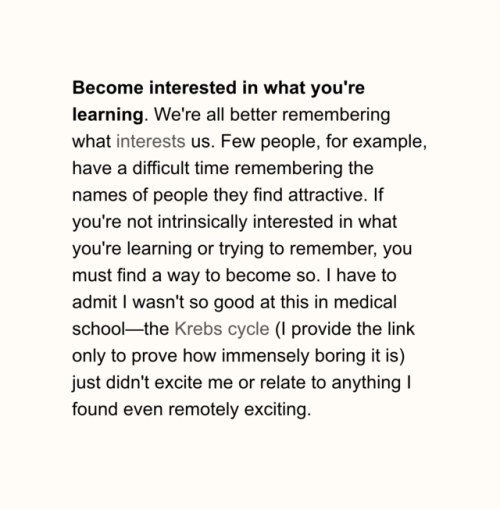

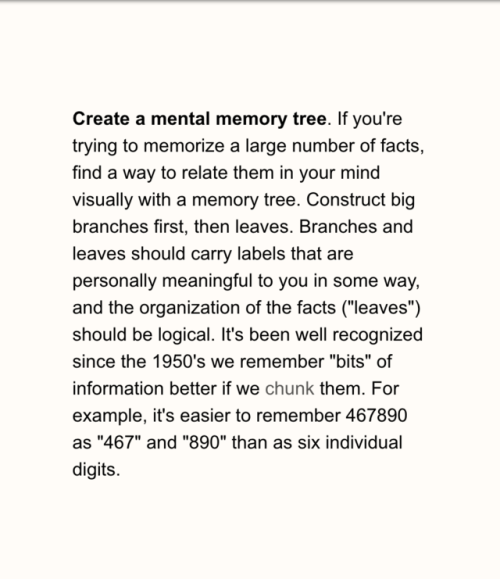
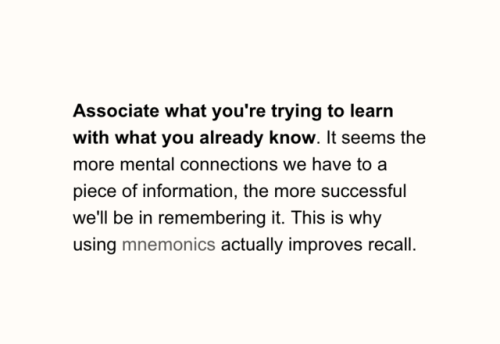

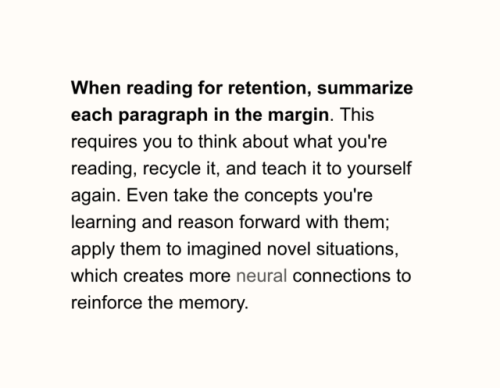
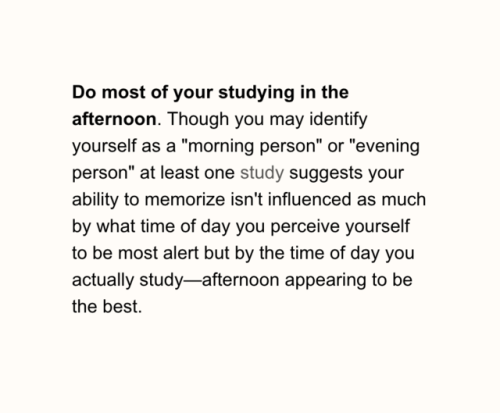

Eight Ways to Remember Anything by Alex Lickerman M.D.
Reference: Research-based strategies to boost your memory and keep it strong via psychology today
-
 lynntrovert liked this · 2 months ago
lynntrovert liked this · 2 months ago -
 herehaveafandom reblogged this · 4 months ago
herehaveafandom reblogged this · 4 months ago -
 5sosfamsolangelo reblogged this · 4 months ago
5sosfamsolangelo reblogged this · 4 months ago -
 alan-apologist liked this · 1 year ago
alan-apologist liked this · 1 year ago -
 sugumm liked this · 1 year ago
sugumm liked this · 1 year ago -
 youreyesblazeout liked this · 1 year ago
youreyesblazeout liked this · 1 year ago -
 textbrick reblogged this · 1 year ago
textbrick reblogged this · 1 year ago -
 awkwardtuatara liked this · 1 year ago
awkwardtuatara liked this · 1 year ago -
 outdent reblogged this · 2 years ago
outdent reblogged this · 2 years ago -
 dapperbunns liked this · 2 years ago
dapperbunns liked this · 2 years ago -
 moveslikegatsby liked this · 2 years ago
moveslikegatsby liked this · 2 years ago -
 intrepiddreamer reblogged this · 2 years ago
intrepiddreamer reblogged this · 2 years ago -
 thaliagivemestrength reblogged this · 2 years ago
thaliagivemestrength reblogged this · 2 years ago -
 deathcultforsanta reblogged this · 2 years ago
deathcultforsanta reblogged this · 2 years ago -
 zahhaked reblogged this · 2 years ago
zahhaked reblogged this · 2 years ago -
 afsyjehevejs liked this · 2 years ago
afsyjehevejs liked this · 2 years ago -
 forbloodandbones liked this · 2 years ago
forbloodandbones liked this · 2 years ago -
 necrcmance liked this · 3 years ago
necrcmance liked this · 3 years ago -
 life-drawing-wizard reblogged this · 3 years ago
life-drawing-wizard reblogged this · 3 years ago -
 kidwithgoggles liked this · 3 years ago
kidwithgoggles liked this · 3 years ago -
 atmos-sphaira liked this · 3 years ago
atmos-sphaira liked this · 3 years ago -
 neverendingstories00 liked this · 3 years ago
neverendingstories00 liked this · 3 years ago -
 wheezier reblogged this · 3 years ago
wheezier reblogged this · 3 years ago -
 porangpuddingkup reblogged this · 3 years ago
porangpuddingkup reblogged this · 3 years ago -
 kylaralynn reblogged this · 3 years ago
kylaralynn reblogged this · 3 years ago -
 kylaralynn liked this · 3 years ago
kylaralynn liked this · 3 years ago -
 argeraakigeminuga-palun liked this · 3 years ago
argeraakigeminuga-palun liked this · 3 years ago -
 narniaandplowmen liked this · 3 years ago
narniaandplowmen liked this · 3 years ago -
 arubiyanetwave liked this · 3 years ago
arubiyanetwave liked this · 3 years ago -
 ruth-gemmells-boob-scar liked this · 3 years ago
ruth-gemmells-boob-scar liked this · 3 years ago -
 moprocrastinates liked this · 3 years ago
moprocrastinates liked this · 3 years ago -
 elphiessolsikke liked this · 3 years ago
elphiessolsikke liked this · 3 years ago -
 ussjellyfish liked this · 3 years ago
ussjellyfish liked this · 3 years ago -
 hexagonification liked this · 3 years ago
hexagonification liked this · 3 years ago -
 babymyleopard reblogged this · 3 years ago
babymyleopard reblogged this · 3 years ago -
 babymyleopard liked this · 3 years ago
babymyleopard liked this · 3 years ago -
 umberellars reblogged this · 3 years ago
umberellars reblogged this · 3 years ago -
 frenchtwistresistance reblogged this · 3 years ago
frenchtwistresistance reblogged this · 3 years ago -
 sparkbroken-knockout liked this · 3 years ago
sparkbroken-knockout liked this · 3 years ago -
 countmilly reblogged this · 3 years ago
countmilly reblogged this · 3 years ago -
 countmilly liked this · 3 years ago
countmilly liked this · 3 years ago -
 celestialsilhouette liked this · 3 years ago
celestialsilhouette liked this · 3 years ago -
 sylvanium reblogged this · 3 years ago
sylvanium reblogged this · 3 years ago -
 deleniam liked this · 3 years ago
deleniam liked this · 3 years ago -
 sailorsoldierlove reblogged this · 3 years ago
sailorsoldierlove reblogged this · 3 years ago
